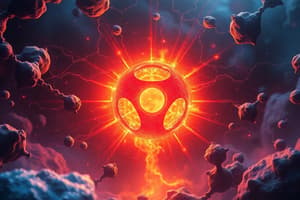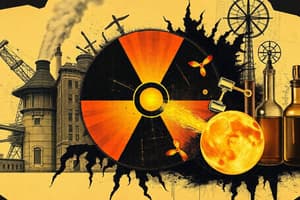Podcast
Questions and Answers
What is a characteristic of alpha particles emitted during radioactive decay?
What is a characteristic of alpha particles emitted during radioactive decay?
- They are high-energy electrons.
- They consist of 2 protons and 2 neutrons. (correct)
- They consist of a single proton and a single neutron.
- They are high-energy gamma radiation.
What is the formula for calculating the half-life of a radioactive substance?
What is the formula for calculating the half-life of a radioactive substance?
- t1/2 = ln(2) / λ (correct)
- t1/2 = ln(λ) / 2
- t1/2 = λ × ln(2)
- t1/2 = λ / ln(2)
What is an example of a nuclear reaction that releases energy?
What is an example of a nuclear reaction that releases energy?
- Gamma radiation emission
- Fusion of light nuclei
- Fission of heavy nuclei (correct)
- Alpha decay of a radioactive nucleus
What is the purpose of using radioisotopes in nuclear medicine?
What is the purpose of using radioisotopes in nuclear medicine?
What is a characteristic of stable nuclei?
What is a characteristic of stable nuclei?
What is the term for the numbers 2, 8, 20, 28, 50, and 82 in nuclear chemistry?
What is the term for the numbers 2, 8, 20, 28, 50, and 82 in nuclear chemistry?
Flashcards are hidden until you start studying
Study Notes
Nuclear Chemistry
Radioactive Decay
- Process in which unstable atomic nuclei release energy and particles to become more stable
- Types of radioactive decay:
- Alpha (α) decay: emission of alpha particles (2 protons and 2 neutrons)
- Beta (β) decay: emission of beta particles (high-energy electrons)
- Gamma (γ) decay: emission of high-energy gamma radiation
Half-Life
- Time required for half of the radioactive nuclei in a sample to decay
- Constant for a given isotope, measured in seconds, minutes, hours, or years
- Formula: t1/2 = ln(2) / λ, where λ is the decay constant
Nuclear Reactions
- Types of nuclear reactions:
- Fission: heavy nucleus splits into lighter nuclei, releasing energy (e.g., atomic bombs)
- Fusion: light nuclei combine to form a heavier nucleus, releasing energy (e.g., stars)
- Nuclear equation: A + B → C + D, where A and B are reactants, and C and D are products
Nuclear Stability
- Stable nuclei: have a stable number of neutrons and protons
- Unstable nuclei: undergo radioactive decay to become stable
- Magic numbers: 2, 8, 20, 28, 50, and 82, which correspond to full energy levels in atomic nuclei, making them more stable
Applications of Nuclear Chemistry
- Nuclear energy: generation of electricity through nuclear fission
- Nuclear medicine: use of radioisotopes for diagnosis and treatment of diseases
- Food irradiation: use of ionizing radiation to preserve food and reduce spoilage
Studying That Suits You
Use AI to generate personalized quizzes and flashcards to suit your learning preferences.




